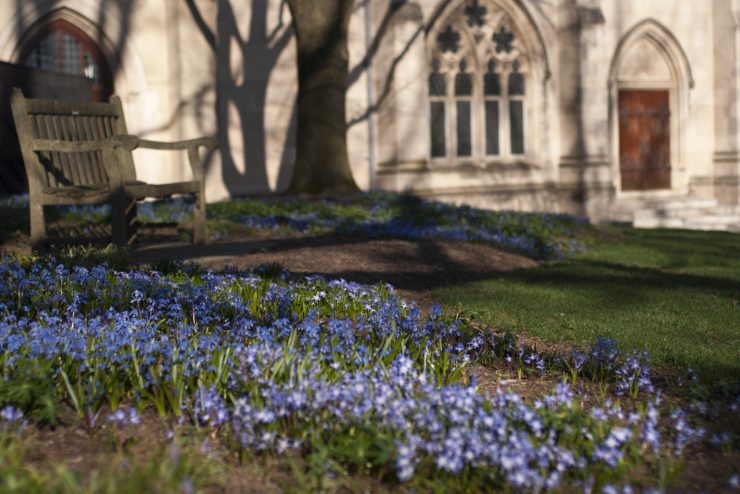Maundy Thursday

Mark 15:16-30
Then the soldiers led him into the courtyard of the palace (that is, the governor’s headquarters); and they called together the whole cohort. And they clothed him in a purple cloak; and after twisting some thorns into a crown, they put it on him. And they began saluting him, ‘Hail, King of the Jews!’ They struck his head with a reed, spat upon him, and knelt down in homage to him. After mocking him, they stripped him of the purple cloak and put his own clothes on him. Then they led him out to crucify him.
They compelled a passer-by, who was coming in from the country, to carry his cross; it was Simon of Cyrene, the father of Alexander and Rufus. Then they brought Jesus to the place called Golgotha (which means the place of a skull). And they offered him wine mixed with myrrh; but he did not take it. And they crucified him, and divided his clothes among them, casting lots to decide what each should take.
It was nine o’clock in the morning when they crucified him. The inscription of the charge against him read, ‘The King of the Jews.’ And with him they crucified two bandits, one on his right and one on his left. Those who passed by derided him, shaking their heads and saying, ‘Aha! You who would destroy the temple and build it in three days, save yourself, and come down from the cross!’
“Hail, King of the Jews”
The end is near. Jesus has had one last meal with his disciples, which becomes a way for them to be together (in communion) with him after his death. Judas betrays Jesus with a kiss and delivers him to the Roman and Temple authorities. And thus begins Jesus’s long, horrific night, culminating in his death on a cross, the Romans’ usual punishment for insurrectionists against Rome.
In the gospels, Jesus at his trial is unusually quiet, only mildly defending himself, knowing that the verdict has already been determined. On the cross, instead of defiant, he is kind and forgiving — to the bandits crucified with him and to his tormentors. Notice the ironic difference between those who capture, convict, and ultimately kill him, and their prey, Jesus. The Roman and Temple leaders have all the power, but Jesus has all the authority. By power, I mean the ability to control others, even against their will. By authority, I mean that quality of a human being’s life which commands respect, exhibits a “peace which passes all understanding,” and inspires others to be their best selves.
Notice also that Jesus is crucified not for preaching love for one another, but for how that love ethic demands a critique of the secular culture. For every clergy person who has been “accused” of bringing politics into the pulpit, Jesus has provided the precedent. The God whom Jesus called “Father” loves us in a way that calls us to love one another as he [sic] has loved us — the mandatum, or commandment, from which Maundy Thursday draws its name.
Blessings,
Gene+
Holy and Living God, in your Son Jesus you show us what a life of authenticity, love, and sacrifice looks like. Give us the desire to follow Jesus in that kind of life, and the courage to love the world in His name, even when there is a price to be paid. Let us take to heart Jesus’s commandment to us this night, and make us a joy to you and a blessing to the world. Amen.